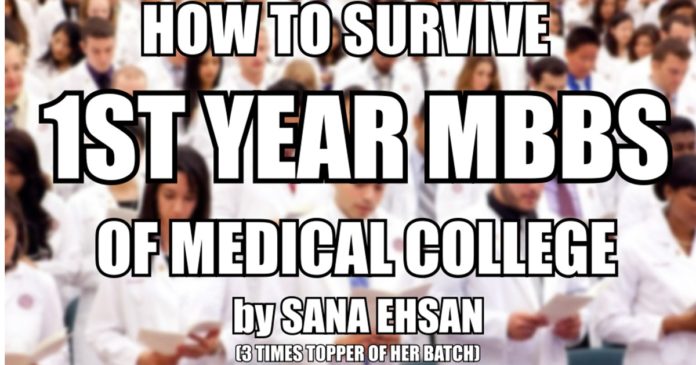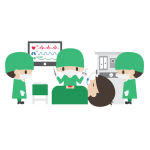This article has been written by Sana Ehsan (Quetta-Urban), she is a 4th-year MBBS student at Bolan Medical College, Quetta. She has consecutively remained 3-times the topper of her batch and has many distinctions to her name. In this article, she shares her advice to the 1st year MBBS students on how to survive 1st year MBBS of medical college.
Beginning in Medical Colleges
From the beginning, time management must be a major priority. If you can manage your time successfully, you can still enjoy your life. Studying in medical colleges is not the same as it was in college; this is a new world where you have to explore different techniques and find what works best for you. In medical school, it is not all about studying hard but also smart. If you don’t know this at the beginning, you will learn it the hard way.
Some introductory tips:
• Maintain your attendance. Try to be punctual and attend all classes, it will not only let you understand syllabus but also by observing the way of teaching you can even envisage (predict) which type of questions may arise in finals.
• Remember, you must have to stay focused and updated to the medical world through spending some time while browsing about medical.
• Give time to your hobbies, favorite sports, watch movies, and hang-out with friends for refreshing your mind.
• Don’t mess with teachers, staff and your fellows because in exams they will keep in mind on the spot performance but also your behavior throughout the year.
• Don’t get involved in unpleasant activities as they spoil your precious time and will divert you from your objective.
• Always be keen to learn as this vast field is not only confined to the syllabus.
• At the end of each unit, you have to go through an internal evaluation as we call them “stage”, don’t get depressed if you couldn’t perform better in first few stages. Because they are just meant to evaluate yourself by you and make you better understand and prepare for the tasks you are going to face in finals.
The following are some of the most common pieces of advice I have collected
1. Learn the big picture. You will likely start your days in college where instructors talk about epithelium, membranes, glycolysis etc in fine detail.This is an enormous amount of information overload and students are often not prepared. As you memorize, learn the big picture
2. Study with groups. Medicine is all about teamwork and sharing information. You have to be able to cooperate with others. Find a small group of people who share the same healthy habits as you, meaning they like to share experiences, they do not like to discuss grades, and they have a positive attitude. Once you find the right group, arrange several hours to ask each other questions about concepts you do not understand and yes for a little fun.
3. Take time to engage in stress-relieving activities. Everyone in your class is facing the same amount of stress, some people more than others. You might notice some students walk around with a frown, whereas others wear relaxed face. How is that possible if they are all facing the same pressure? Again, it is time management. If you have extra time, you are able to reduce stress. Spend time with friends, or do something on your own that makes you feel better. Activities like exercise, listening to calm music, talking to your parents or praying — there is something out there that makes you feel better. Find it and do it. Do not let the stress affect your studies, relationships and, most importantly, health.
4. Take care of yourself. You may face long-term negative consequences to your health if you adopt negative behaviors. Do not deprive yourself of healthy, fresh food.
5. Do not compete with your classmates or compare your grades with others. We all had to be competitive to get into medical colleges. But once you are accepted, it becomes a level playing field. Getting a 95% on your pathology exam does not mean you will be a great pathologist or clinician. But yes compete with yourself try to be better each day than you were yesterday!
6. Answer practice questions while you study. “Studying my notes 10 times is probably the best way to prepare for exams.” Wrong! The only way to test your learning is to do practice questions. This will help solidify the concepts you just read. Studying the same thing repeatedly does not make you smarter, but getting a question wrong and then re-reading will teach you quite a bit.
Study Tips for Medical College
Now you are going to study what is thought to be most arduous by many people and by far they are right, but with good management and finding ways to make this interesting field more interesting can ease this. Here are some tried and tested tips by me, hopefully you may find them helpful. 🙂
- Read recommended standard text books for each subject from the beginning don’t rely on the short books as these are made for review only.
- Start studying a little, but from the very first day and every day.
- Adjust your study hours according to your ease 2-3 hours of study apart from lectures is enough. Give specific time to each subject as nothing is unimportant spend more time on credit hour subject.
- Study in an environment which suits you best as every single person is different from other. Some learn best in silence some in a close room, other in open lawn, some read loudly and other silently. So just find out your way. (In my case, I used to study Anatomy in group, Physiology in pin drop silence and Biochemistry with slow music 🙂 ).
- Make a checklist for the week, give yourself targets for each day and try to accomplish them.
- Discuss with your friends at college and hostels as this is two-way teaching and learning method.
- Clear your concepts about every topic instead of stuffing it without understanding, it will be easier to reminiscences longer and have conceptual clarity of the topic.
- If you don’t understand something at first, give it a second chance, then third after that you will surely grab it or ask teachers or seniors as it is a learning environment and everyone is a student of the medical world.
- Revise what you have learned if you read a topic today review that after a week then again the same after a month this will become your long term memory.
- Highlight important text in the book and write additional points on the book as you find them from teachers or other standard sources.
- Never read continuously without any break for more than 40 mins (eat and drink some light things with intervals).
- Look at 20 feet distance for 20 seconds after every 20 minutes it really helps you to improve your concentration and vision power.
- Get a good night sleep, different people need different amount of sleep some may function well even after 7 hours of sleep and some may need even more than 9, so make your study schedule accordingly, in my case I am used to sleeping early but still can’t wake up timely in morning so in prep leaves I schedule my studies in day time.
- While preparing for your exam start from the important topics from examination point of view. If you have studied steady the whole year now you will only need revision if you have not you will be in trouble.
- Stay cool and calm, don’t get panic/anxious, be confident on what you have studied and also on what you have not because some time by relating all your knowledge you can even answer correctly some questions which you have never studied.
- I have seen many students who study hard whole year but couldn’t perform well at the end reason being either they panic or become over confident and these both are harmful.
- During exams try to stay away from things that distracts your concentration (in my case laptop does the same). Deactivate your social media accounts during examination days.
- In exam they not only see your knowledge but your way of conveying the same. Your behavior, alertness, your power of relating things with each other so don’t be book worms instead work for your other skills as well.
• Finally! when you are done with preparation. Now practice on past papers they will give an idea about final exam.
Recommended Books for 1st Year MBBS
Here are some recommended books for 1st Year MBBS:
Anatomy
- Grays anatomy by Prof. Susan Standring
- Clinical oriented anatomy by KLM
- B.D chaurasia (for osteology)
- B.D chaurasia hand book for general anatomy
- The developing human clinicaly oriented embryology by KLM
- Langman embryology
- Medical histology by Prof. Laiq Hussain
Physiology
- Text book of Physiology by Guyton and Hall (In my opinion it is enough for Physiology)
Biochemistry
- Lippincot illustrated review of Biochemistry
- Satyanarayana Biochemistry
Tips for examination
A night before exam give a quick review to all important topics you have studied, don’t get worried about what you have not otherwise you will forget even those which you have prepared. Gather your pens, wrist watch and roll no slip at night, so that in morning you don’t need to find them. Get a good night sleep so that you remain fresh next day take a light breakfast when you wake up. Many students do all above things but still not get what they want. Because they don’t perform in exam in a way which is needed so here are some tactics which may help you.
- Be cool and calm.
- You will be given an objective paper first. First of all carefully read the instructions given on paper.
- Read each question carefully there is always a ‘key word’ in each question which depicts the whole question. If you are 100% sure about the answer then mark at the time of reading, otherwise leave it for the time being and move to next. At the end give time for each question you have skipped (as overwriting is not accepted at all).
- Utilize your whole time as I have seen some students who submit their objective paper in first half hour, good if they were sure about every question but if not then they should at least take some time to recall. (I always bring water, some candies and biscuits with me, there I need them a lot you can eat them in the interval between objective and subjective paper).
- Making sure you have attempted all questions then submit your paper and after that completely forget about it, as they will never return it back once you have submitted 😉
- Now you will be outside the hall, don’t discuss about what you have done and what others, because when you come to know you have marked some questions wrong you will get depressed and wouldn’t perform well in your next subjective paper.
- After attempting objectives, they will give you subjective paper, again write down your roll number and other details and read each question carefully. Divide your time for each question according to marks, and try to attempt all questions. Make immediately a rough time table in your mind, for example, you are given 10 question and asked to writen any 7 of them and given 2 hours for this. Spend one minute for each question to gather the information you have about that in your mind, then spent remaining time to re-read/ recheck if you have skipped something important to add.
- Write down number of Question correctly, which you are going to write, if you write it wrongly, you will not get marks at all.
- Writing doesn’t matters as a whole, I think because no one could have writing worst than me but yes it should be readable. 😀 The thing which matters is overall look of your paper and neatness for this use good quality pens and markers and of course what you write matters most .
- Never write in large paragraphs always give headings what you are going to explain.
- Only write about what is asked don’t distract from theme of question and avoid unnecessary and irrelevant explanation as this only waste your time. But yes don’t miss important points which can help you to get maximum marks. Avoid overwriting as it makes your paper look bad.
- Attempt all questions, never leave any question even if you don’t have much details about that try to write all your knowledge about the question.
- Once you have done take a glance to each question. Check roll number. Make sure you have stapled if you have used continuous sheet because sometimes they may get misplaced.
- Submit your answer sheet and hope for the best. 🙂
Viva and practical performance
- You will be given few days to prepare for this as in my opinion you have to study the same thing in different manner for viva and exam.
- At your turn prepare your mind, stay calm and be confident.
- Don’t answer too quickly, listen carefully and understand what examiner wants to know.
- Usually examiner starts with basic questions and move to difficult ones. Until you get stuck. More far you go, more will be good for you.
- Sometimes they ask very basic and easy question which have simple answers but we can’t answer them correctly because of not understanding the only keyword in that question.
- Every examiner have different ways of asking questions but all have good expectation from students.
- You can only understand them well, when you have taken their classes throughout the year and given all your stages this all give you a rough idea about this day.
- Most of the examiners get angry when we start telling details after answering because they are not asking to make them clear about that, they are just testing you know this or not. So don’t go for the whole story. On the other hand some examiners need a full description for what they ask, for them don’t take break once you have started until they stop you.
- If you don’t know the answer correctly at least tell something and don’t remain silent. But don’t tell something completely irrelevant this again makes examiner angry and you will be in trouble for next question. 😀
- Don’t get panic during viva and stay calm throughout that short period.
Finally, remember that we are joining a great profession. You should feel professional, look professional and behave professional. Be passionate about what you are learning! Medicine is a treasure and an art. 🙂
Be smart and stay focused! Life Teaches… 🙂
GOOD LUCK! 🙂




![Toronto Notes 2022 PDF Free Download [Direct Link]](https://www.medicosrepublic.com/wp-content/uploads/2023/01/Toronto-Notes-2022-PDF-Free-Download-150x150.jpg)
![Concise Histology 1st Edition PDF Free Download [Direct Link] Concise Histology 1st Edition](https://www.medicosrepublic.com/wp-content/uploads/2023/06/Concise-Histology-1st-Edition-PDF-1-150x150.jpg)
![Exercise Balls For Dummies PDF Free Download [Direct Link] Day Trading For Dummies PDF](https://www.medicosrepublic.com/wp-content/uploads/2023/04/Day-Trading-For-Dummies-PDF-Free-Downlo-150x150.png)
![Learning Medicine: An Informal Guide to a Career in Medicine 15th Edition PDF Free Download [Direct Link] Learning Medicine An Informal Guide to a Career in Medicine 15th Edition PDF](https://www.medicosrepublic.com/wp-content/uploads/2023/06/Learning-Medicine-An-Informal-Guide-to-a-Career-in-Medicine-15th-Edition-PDF-150x150.jpg)
![First Aid for the Match 5th Edition PDF Free Download [Direct Link]](https://www.medicosrepublic.com/wp-content/uploads/2023/02/First-Aid-for-the-Match-5th-Edition-PDF-Free-Download-150x150.jpg)
![Boundaries: When to Say Yes, How to Say No to Take Control of Your Life PDF Free Download [Direct Link] Boundaries PDF](https://www.medicosrepublic.com/wp-content/uploads/2023/03/Boundaries-PDF-150x150.jpg)

![Duke Radiology Case Review: Imaging, Differential Diagnosis, and Discussion 2nd Edition PDF Free Download [Direct Link] Duke Radiology Case Review PDF](https://www.medicosrepublic.com/wp-content/uploads/2019/05/Duke-Radiology-Case-Review-PDF-150x150.jpg)
![Lecture Notes: Gastroenterology and Hepatology 2nd Edition PDF Free Download [Direct Link] Lecture Notes: Gastroenterology and Hepatology PDF](https://www.medicosrepublic.com/wp-content/uploads/2019/03/Lecture-Notes-Gastroenterology-and-Hepatology-pdf-1-150x150.jpg)
![Oxford Desk Reference: Rheumatology PDF Free Download [Direct Link] Oxford Desk Reference: Rheumatology PDF](https://www.medicosrepublic.com/wp-content/uploads/2018/10/Oxford-Desk-Reference-Rheumatology-PDF-Free-Download-150x150.jpg)





Pease bro tell me that how can i download this books and videos thank you
Thank you for this information
But what is right way to answer to get full marks specially for anatomy.
I really love the way you share knowledge globally. With your effort i built up a very hard foundation of Medical concept. Thank you and God bless with reward.
I really love it thanks a lot